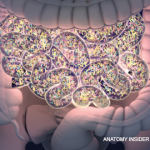Focus for Human Research
This was a well-done study, according to Andras Perl, MD, professor of medicine at the State University of New York Upstate Medical University. Syracuse. There are two important things to take away.
“Number one is that we are finding that environment can influence SLE in this mouse model,” he says. “In these mice there is a particular bacterium (L. reuteri) that drives autoimmunity. It stimulates the immune system through the expression of TLR7 by the bacterial DNA.”
The other key finding is that bacterial expansion is related to short-chain fatty acids. The availability of short-chain fatty acids inhibits the proliferation of L. reuteri, suggesting certain types of fatty acids might actually be good for you. “Whether or not this is true for humans, especially for patients with lupus, of course, is still an open question,” says Dr. Perl. “I think human research can now focus on how the bacterial flora can change the development of the disease.”
Kurt Ullman has been a freelance writer for more than 30 years.
Reference
- Zegarra-Ruiz DF, El Beidaq A, Iñiguez AJ, et al. A diet-sensitive commensal lactobacillus strain mediates TLR7-dependent systemic autoimmunity. Cell Host Microbe. 2019 Jan 9;25(1):113–127.e6. doi: 10.1016/j.chom.2018.11.009.


